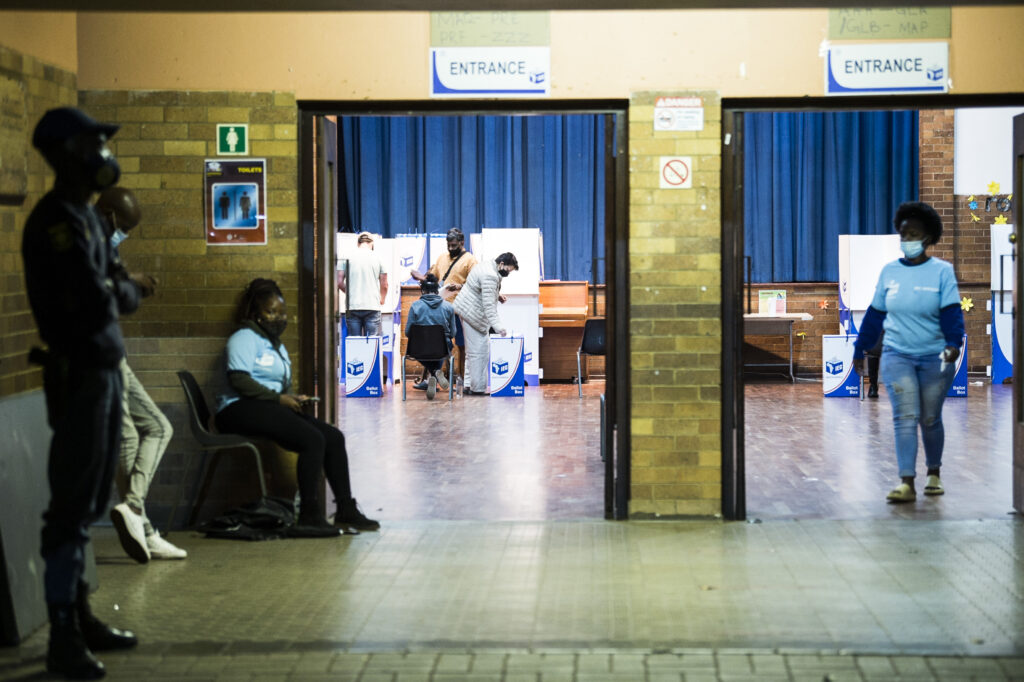
As voters, we have to scrutinise policies carefully and use our voting power to force parties to address the climate crisis. (Delwyn Verasamy/M&G)
Ahead of the 29 May elections voters are being bombarded with promises about fixing the economy, the energy crisis and potholes. But climate policies are once again neglected.
Job creation, economic growth and service delivery take front and centre stage when it comes to parties’ promises and manifestos. Voters will lend their vote according to these promises, or take it away because of failures to deliver on these promises. Creating employment and stimulating economic growth form the foundation for addressing past economic exclusion as well as closing the gap between the rich and the poor, something at which South Africa performs dismally. Most voters are already straining under high inflation, unaffordable rises in fuel costs and the unavailability of electricity.
Yes, these issues need to be addressed by the political parties, and aggressively so.
But, when deciding which party to vote for, voters must assess parties on their understanding of the current and future effects of climate change, especially th effects it has on the consumer. These policies must speak not only on mitigating the environmental effects of climate change. They must also include tangible, workable plans to protect and expand the economy when things really heat up.
As a farmer and red meat producer, climate change threatens the very industry in which I work and to which I have dedicated my life. More importantly, it will have a devastating effect on the consumer, resulting in sharply soaring food prices and increased levels of food insecurity.
The power voters wield over political parties is immense and one of the most underrated and least-used tools in our arsenal. Voters can and must insist on which policies are to be addressed by parties, and ultimately the government. We aren’t passive rats on a ship, but rather the rudder steering politicians and government.
The time has come for voters to demand that political parties recognise the importance of climate change policies and how they propose to tackle this hot topic. It would be shortsighted to say that this isn’t a “bread-and-butter” issue and that this only warrants consideration by the well-to-do section of society. That it will have no effect on voters who struggle every day to make ends meet. Climate change is already affecting South Africans’ wallets and budgets, making it even harder to make ends meet.
When we consider the 2022 floods in KwaZulu-Natal and the Eastern Cape, the infrastructure bill paid for by citizens’ tax money is staggering, estimated to be about R7 billion. Floods like these and severe droughts have a direct effect on food prices and availability because they affect farmers’ ability to produce food. And if science is anything to go by, things are set to get worse.
Last year and 2024 are record years for all the wrong reasons. The Northern Hemisphere smashed heat records during its 2023 summer season, and the world was given a sneak peek of what to expect shortly. The United Nations’ secretary general, António Guterres, coined this post-global warming era Global Boiling. Back home, we also felt the heat. In one of the first heatwaves this summer, November 2023 saw South Africa smashing previous heat records.
Statistics South Africa reported: “On the 27th of November [2023], more than 10 weather stations recorded the highest temperature records with the Automatic Weather Station at Augrabies Falls, in Upington, recording the highest maximum temperature of 46.7°C. These high temperatures have harmed the agriculture sector (one of the most climate-sensitive industries), causing crop yields to decrease and increasing livestock losses.”
In another heatwave in March, temperatures again rose above anything we experienced before. On 18 March, several weather stations had the mercury rise high above the 40℃ mark. This heatwave, coupled with significantly below-average rain in the interior, means South Africa can expect a below-average maize yield because crops singed in the sun. We can therefore expect a rise in the price of food, an inflation poor South Africans can scarcely afford.
Also worrying, a recent study showed that livestock will increasingly be subjected to longer periods of heat stress. This will lead to a decrease in production and fertility and the mortality of animals will increase to unsustainable levels.
Across the board, climate policies are lacking, with only a few cursory mentions of climate change. For the most part, climate is absent in this year’s manifestos of political parties. You can judge for yourself to read some of the parties’ 2024 election manifestos: ANC, Democratic Alliance, Economic Freedom Fighters, Freedom Front Plus, ActionSA and RISE Mzansi
As voters, we have to scrutinise these policies carefully and use our voting power to force parties to address this crisis. Climate change is not in the realm of “let us deal with this after the economy is fixed”. Policies must form an integral part of the economy as it stands now and should, therefore, also be foremost in the minds of voters come 29 May.
Philip Kruger is a Bonsmara stud farmer in the Free State.
 (1).png)
 7 months ago
24
7 months ago
24


















